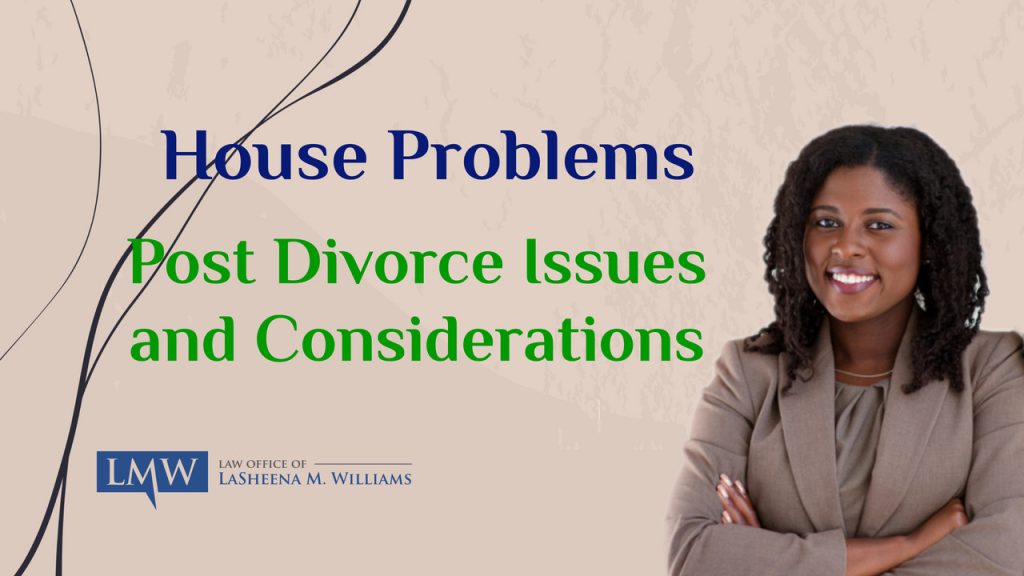Thank you for joining me. My name is LaSheena Williams, and I am a Maryland family law attorney. My firm helps our clients take control of out-of-control domestic situations. Today we will be discussing post-judgment house concerns.
Spouse Fails to Buy you Out
If you have a marital settlement agreement or a court order where your spouse has agreed to buy out your interests within a set period, it may come to a point where if your spouse fails to do that during that period, that you need to understand and know what your options are. If you want to give your spouse additional time to try to buy you out, that’s an option, or you can ask the court to force a sale of your home because your spouse might not actually be able to buy you out. They may be having credit issues. They may not necessarily be employed, and it just might not be likely that they could buy you out. So, you can go to the court and see that the house gets sold because they’re not capable of holding up to their end of the bargain. What you must consider, at minimum, is when entering into judgments of absolute divorce or entering into marital settlement agreements, providing the terms for when they will buy you out and what the course of action should be in the event that they are not able to do it because it’ll be easier for you if that’s already spelled out in the terms where you’re giving them the benefit of the doubt, but just in case that doesn’t work out you have a backup plan.
Spouse Delays Sale of Home
If you have court order or an agreement where you and your spouse both agree or are ordered to sell your home and they are doing everything in their power to avoid the sale, you have options. You could potentially for file a motion for specific performance to force them to do that to make sure the house is sold. You could file a motion to force the sale of the home and have a trustee appointed. In that situation your spouse would not necessarily be needed to sign any documentation because the trustee would be empowered to sign any documents necessary to make sure that the sale actually happens. So, it may take going to court to make this happen, but if you properly draft an agreement or if the terms of the Judgment of absolute divorce are clear about when a sale is supposed to happen or what happens in the event that someone fails to comply with the terms of the agreement or court order, the language should have something along the lines of having the other party be required to pay any attorney’s fees for you having to force them to do what they are legally obligated to do in the first place. So, it may be a cost up front, but in the end, you will have a sale and they will ultimately likely have to pay your attorney’s fees.
Spouse Stops Paying Mortgage According to Court Order
If your spouse is allowed to stay in your home and whether it’s a use of possession period or there’s by agreement or the court allows them to stay in while they’re working on getting refinanced. whatever those terms may be if they are required to pay the mortgage and property taxes, and HOA fees or condo fees during that period, and they fail to do so you should have language in your agreement or your order that if they fail to make those payments. You can force a sale. You can either go into the home or do whatever you need to do that the home can be turned over to you. There are lots of options that you could have included in an agreement or Judgment of absolute divorce in the event your spouse is no longer able to pay on the mortgage.
If you have any questions regarding what to do with your home and post-judgment issues from divorce or any other matters related to divorce in Maryland, contact the Law Office of LaSheena M. Williams at (301) 778 – 9950 or leave an online request for a consultation.


